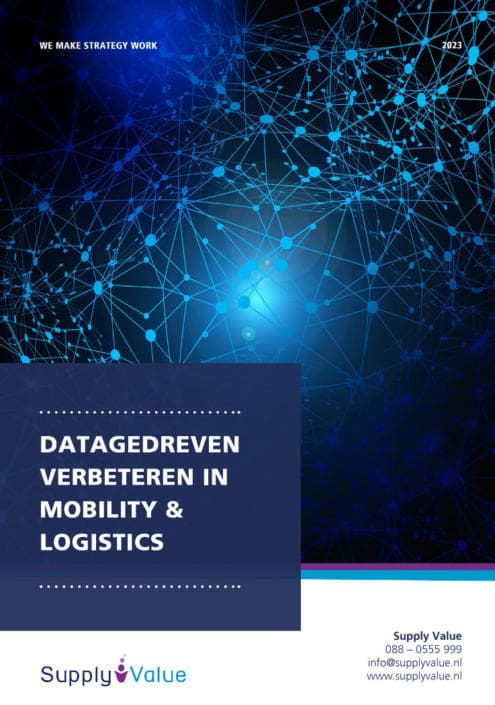Data Maturity Model
The Data Maturity Model (DMM) is an advanced framework employed by Supply Value to assess the data-drivenness of your organization. It provides insight into how organizations can develop data as strategic value, much like information provision. The outcome of the model consists of five levels of data maturity, ranging from level 1 (basic) to level 5 (optimized). Each level represents an increasingly sophisticated and effective use of data. Not only does the model map out the maturity level, but also the areas where actions can be taken, such as data, processes, organization and policy, and technology.
The DMM was developed by the Data Governance Institute (DGI), a global professional organization that promotes best practices in data governance and management. The model was used for the questionnaire compiled by Supply Value and is based on the principles that data is a valuable asset, can improve decision-making, increase operational efficiency, and can stimulate organizational growth when effectively managed and utilized.
The five maturity levels of DMM are as follows:
- Basic: At this level, an organization has a limited understanding of its data and may lack a formal structure for data management. Data may be in silos and not easily accessible, with little to no use of data analysis or data-driven decision-making.
- Repeatable: At this level, an organization has established basic data management processes and may have a data dictionary or catalog to document its datasets. Data begin to be used for reporting and basic analysis but may still be placed in silos and not fully integrated throughout the organization.
- Defined: At this level, an organization has a more formalized structure and processes for data management, including defined roles and responsibilities for data management. Data are used for more advanced analysis and decision-making, with a greater focus on data quality and integrity.
- Managed: At this level, an organization has a mature data governance structure and a strong focus on data quality and integrity. Data are integrated throughout the organization and used for strategic decision-making and business planning. There is also a greater emphasis on data security and privacy.
- Optimized: At this level, an organization has fully integrated and optimized the use of data throughout the organization. Data are treated as a strategic asset to drive business growth and innovation. There is a strong focus on data-driven work and continuous improvement of data management.
The DMM can be used by organizations to assess their current level of data maturity, benchmark, and identify strategic and operational improvement points. By filling out the form below, Supply Value will contact you and arrange a meeting to jointly complete the survey. Subsequently, the report will be discussed with you.

Article: Data-driven improvement in the near future
This article briefly describes the expected developments of data-driven improvement and the connection between the three topics of Supply Value's campaigns, from the Mobility and Logistics market, in 2023: data-driven improvement, Integrated Business Planning (IBP)...
Insight: Points of attention for a successful implementation of data-driven improvement
If you do it right, data-driven improvement contributes to better decision-making and service provision. It provides insight and enables management based on (real-time) data and information. In this way, not only better but also faster decisions are made. Our...
Whitepaper: Data-Driven Improvement in Mobility and Logistics
Organisations that work in a data-driven manner manage their operations based on facts derived from data. Data-driven improvement offers significant benefits, helping you make (faster) well-founded strategic decisions, improve predictability and anticipation, and...



Contact us
Contact us today for a free consultation and discover how Supply Value can revolutionize your digital operations. Let us be your trusted partner in achieving digital excellence.


